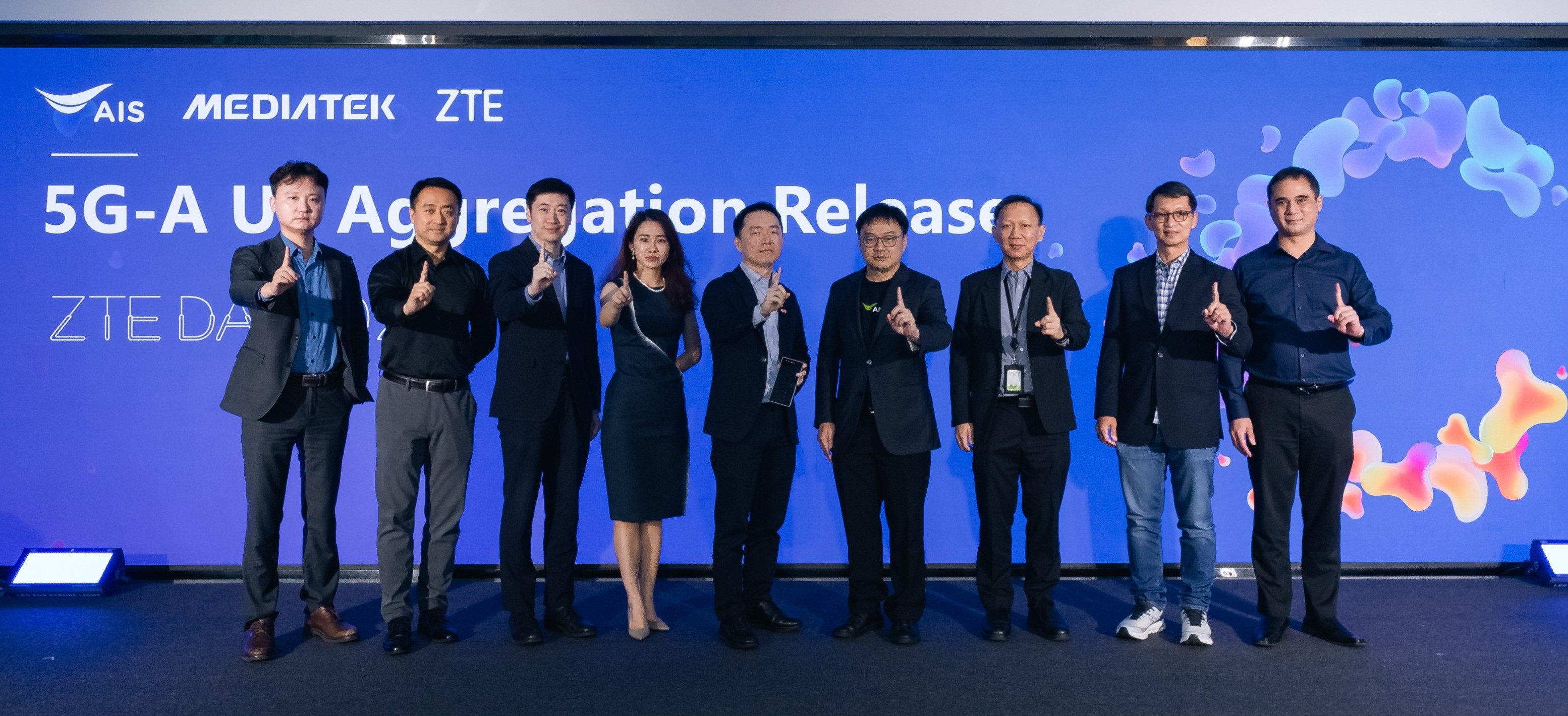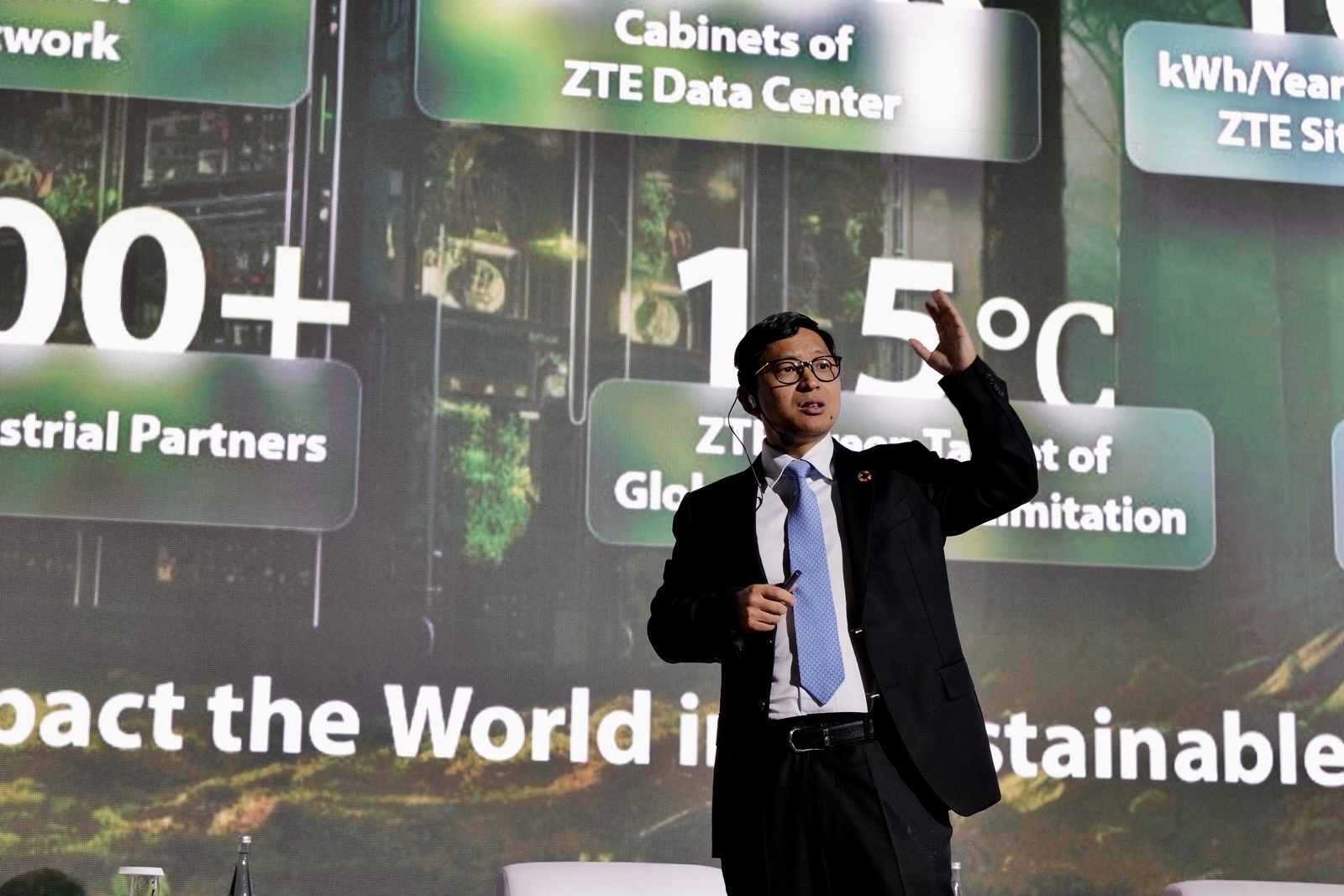ZTE, AIS and MediaTek jointly unveil UE aggregation technology, advancing 5G-A to new heights
- ZTE, AIS, and MediaTek successfully demonstrated UE Aggregation technology in the test lab of AIS-ZTE Innovation Center, achieving up to 3x uplink speed improvement and enabling smooth 4K live streaming even at the cell edge
- UE Aggregation, now part of 3GPP standards, combines power, bandwidth, and channels for stronger multi-device connectivity
Bangkok, Thailand, 27 May 2025 – ZTE Corporation (0763.HK / 000063.SZ), a global leading provider of integrated information and communication technology solutions, in collaboration with Thailand's leading mobile operator AIS and MediaTek, hosted a live demonstration of 5G-A UE Aggregation at the A-Z Innovation Center in Bangkok. This event marked the first global showcase of this cutting-edge technology, representing a key milestone in bringing multi-device collaboration into real-world 5G networks.

ZTE, AIS and MediaTek jointly unveil UE aggregation technology, advancing 5G-A to new heights
With the growing popularity of applications such as extended reality (XR), 4K live broadcasting, and immersive metaverse experiences, single user equipment (UE) faces inherent limitations in power, spectrum, and channel capacity. UE Aggregation offers a compelling solution by enabling Remote UEs to collaborate with nearby Relay UEs. Relay UEs can contribute their spare resources to enhance the uplink performance of Remote UEs, effectively breaking through the bottlenecks of single-device capabilities.
UE Aggregation integrates three key dimensions of cooperation to create a robust and efficient uplink transmission chain:
• Power Aggregation: The Relay UEs assist with signal forwarding, improving uplink connectivity in areas with weak coverage.
• Bandwidth Aggregation: Relay UEs share their unused spectrum resources, boosting the Remote UE's uplink throughput.
• Channel Aggregation: Remote and Relay UEs simultaneously establish independent communication links, enabling multi-path transmission and enhancing reliability and redundancy.
The live trial was conducted in A-Z center lab based on AIS commercial 5G network configuration, using ZTE's 5G gNodeB and core network equipment. MediaTek supplied prototype terminals equipped with UE Aggregation capabilities. Test scenarios simulated collaboration between Remote and Relay UEs, with direct comparisons to conventional single-device setups.
Performance was evaluated based on wireless uplink throughput and real-time 4K video streaming from mobile devices, achieving following results:
• Uplink speeds for edge users improved by up to three times with UE Aggregation enabled.
• Without aggregation, uplink throughput is insufficient for stable 4K live streaming, resulting in frequent stuttering and frame drops.
• When aggregation was activated, uplink can support smooth and high-quality 4K live streaming with consistent quality and no noticeable frame loss.
UE Aggregation has been incorporated into the 3GPP Release 18 specifications and will continue to evolve in future releases (Releases 19 and 20). Future iterations will support multi-path routing, multi-relay architecture, inter-DU/CU coordination, and intelligent low-latency path optimization—laying a strong foundation for future use cases in industrial IoT, vehicle-to-everything (V2X), and XR.
Mr. Wasit Wattanasap, Head of Nationwide Network Operations & Support of AIS, remarked:"UE Aggregation is a landmark step in enhancing 5G-A uplink services. It brings new levels of performance to live media, XR, and industrial applications."
Dr. HC Hwang, General Manager of Wireless Communication Systems & Partnerships at MediaTek, added:"UE Aggregation underscores our long-term commitment to investing in and developing the latest in connectivity technology, driving platforms that are capable of supporting a smarter and more connected device ecosystem."
Chao Xiong, Deputy General Manager of RAN Product Marketing at ZTE concluded:"This collaboration showcases the readiness of UE Aggregation and establishes a model for scalable device cooperation in next-gen networks."



